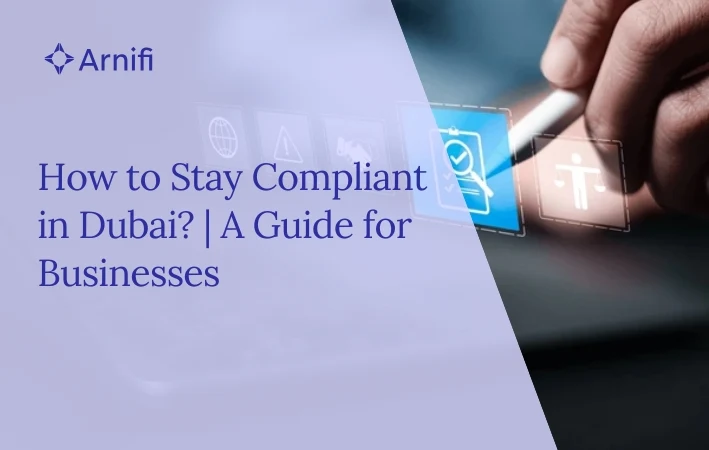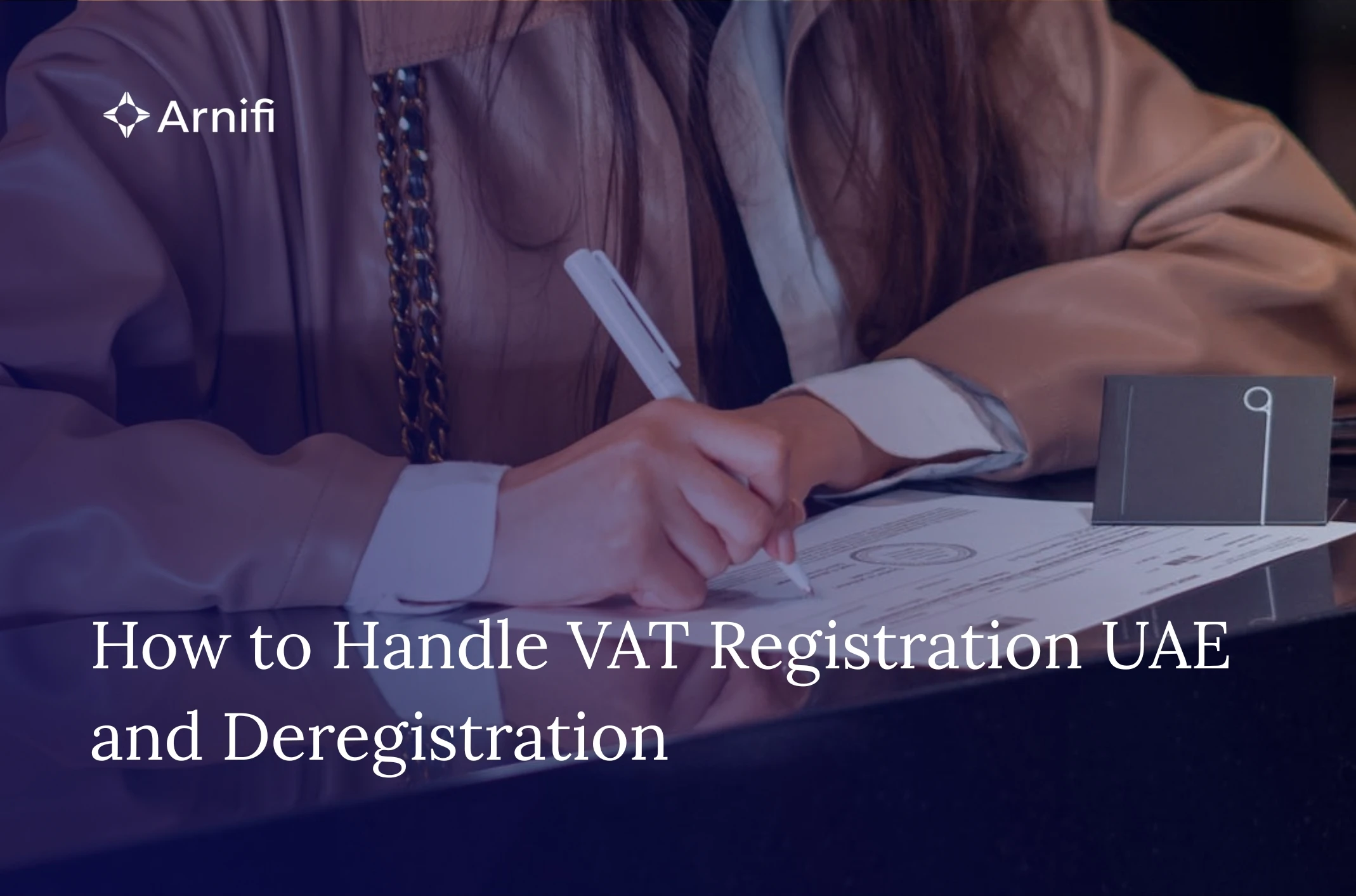How to Stay Compliant in Dubai? | A Guide for Businesses
by Shethana Aug 13, 2025  8 MIN READ
8 MIN READ

Dubai is an alluring venue where modernism meets entrepreneurship, drawing forth its share of appeal with all its business-friendly regulations. The critical success factor, however, is an understanding of the regulatory environment within which such business undertakings are carried out. It must be known that here, compliance is underlined and not an issue for consideration.
Table of contents
1. Introduction
At the same time, it must also be stressed that non-compliance with UAE regulations puts the respondent on the way to terrible financial penalties, extended periods of suspension of an operation, and possibly endangers the applicant’s future. To survive and maintain that extra edge in the ever-growing competition, compliance is one area where players must get their bearings right. This article we’ll discuss the various aspects of business compliance in Dubai and present methods to keep your ventures on the good side of the law.
2. Why Compliance Matters for Businesses in Dubai
Compliance with Dubai’s regulatory framework is important for a number of reasons. Poor legal compliance means great financial losses and legal actions. Non-compliances can mean fines, license suspensions, or even business closure in serious cases.
Reputation stands in direct relation to compliance; thus, it is safe to say that the reputation of any company will be maintained with respect to its compliance record. Having a compliance patchwork adds to the trustworthiness of the entity in the eyes of clients, associates, and law, as well as government authorities. It becomes even more sine qua non when it comes to winning and holding investors, given the noticeable attraction from stakeholders whom one can lure to his interest when he has his fingers on guilt or sham.
Filings of Value Added Tax (VAT) serve as an example of an ordinary compliance requirement. Businesses that meet the revenue threshold on VAT registration must file their return quarterly or monthly with due accuracy, lest they suffer penalties for not keeping their records in good standing since 2018. In this aspect, it shows the government’s intentions to have utmost transparency and accountability in financial matters.
3. Key Compliance Requirements in Dubai
Navigating Dubai’s regulatory environment requires a clear understanding of several key obligations.
Business License Renewals
To run any lawful activity in Dubai, a valid trade license remains the basic requirement. The licenses should be renewed on an annual basis; otherwise, an additional AED 5,000 fine may be imposed in case of late renewal. Any person violating this even for a second time or operating without a valid license runs the risk of suspension of business activities, or worse, even being blacklisted.
VAT Registration & Filing
Value Added Tax (VAT) is one of the most vital aspects of financial regulation in Dubai. Companies making taxable supplies and imports of more than AED 375,000 annually have to register for VAT. After registration, a company is obliged to file VAT returns, generally every quarter, whereas those companies having an annual turnover of AED 150 million or above have to do so every month. A fine can be levied for failure to register before the deadline, for not submitting the returns on time, or for not maintaining appropriate records.
Financial Record-Keeping
Every commercial entity in Dubai must properly maintain financial records in compliance with UAE commercial law. Record-keeping should normally be done for a minimum of five years, but may also be subjected to an annual audit, depending on the type of company and its jurisdiction (this is required for both mainland and several free zones). Good record-keeping is necessary not only as a legal requirement but also for VAT compliance and matters regarding corporate tax.
To help with global business expansion
make sure you choose us.
Get in touch with our team to find out about our approach
BOOK FREE CONSULTATIONResponse within 24 Hours
Great, please give us a brief detail about your business.
Economic Substance Regulations (ESR)
The Economic Substance Regulations exist to comply with international norms in respect of harmful tax practices, thereby requiring UAE companies conducting “Relevant Activities” to exhibit that they are holding an Economic Presence in the country. The affected companies are required to submit the annual ESR notification and, in case the income is derived from the relevant activity, an economic substance report. Noncompliance may lead to the imposition of pecuniary fines.
Anti-Money Laundering (AML) & KYC Compliance
The UAE has set stringent Anti-Money Laundering (AML) and Counter-Financial Terrorism (CFT) regulations, in line with internationally set ones. Financial institutions and certain Designated Non-Financial Businesses and Professions (DNFBPs) are required to create and maintain effective AML policies. These AML policies ensure that several steps are taken on a variety of KYC measures, such as customer transactional monitoring, suspicious activity reporting, and the like, to the competent authorities using the goAML portal.
Ultimate Beneficial Owner (UBO) Reporting
As a step toward greater transparency, all companies in Dubai are obliged to maintain an Ultimate Beneficial Owner (UBO) register and submit it to the authorities competent for keeping the register. A UBO is defined as an individual who ultimately owns or controls 25% or more of the company’s shares or voting rights. Noncompliance, along with a severe fine, may also imply non-reporting of amendments to UBO data to the registrar within a time frame of 15 days.
4. Practical Steps to Stay Compliant in Dubai
Ensuring compliance with a dynamic regulatory landscape in Dubai requires active management. The following is a shortlist of practical solutions a business can apply:
- Maintain a Compliance Calendar: Set deadlines for any license-renewal programs, filing of VAT, ESR, and UBO-submissions, and other regulations. This elementary tool can help avert any costly loss of oversight.
- Partner with Professional Advisors: Time and risk minimization; consultants on the business setup and compliance will greatly help the organization. The Post-Compliance Services full scope will ensure that one’s organization will always meet its obligations.
- Regularly Review Legal Changes: The laws and regulations governing the UAE can be modified or amended. It’s very important to know about those changes for the ones affecting the industry and, thus, the business operations.
- Use Digital Tools: Using accounting software and online portals provided by authorities such as the Federal Tax Authority eases timely and accurate submissions of VAT returns, ESR reports, and UBO declarations.
To help with global business expansion
make sure you choose us.
Get in touch with our team to find out about our approach
BOOK FREE CONSULTATIONResponse within 24 Hours
Great, please give us a brief detail about your business.
5. Common Compliance Mistakes to Avoid
Regardless of their intentions, businesses may sometimes operate in ways that have the potential to breach compliance. Some of the more standard traps into which businesses have fallen include:
- Missing Filing Deadlines: This is often an error that incurs automatic fines because of the late filing of VAT returns or delayed returns of licenses.
- Incorrect VAT Returns: Any discrepancies in VAT calculations, errors in sales reporting, or wrongful claims for input tax can result in penalties and audits.
- Not Updating Business Licenses: Any shifts in business activities, location, or ownership have to be duly noted in the trade license. It becomes a crime to operate outside the purview of one’s license.
- Poor Document Retention: Not preserving financial and other compliance-related documents for the required period can attract penalties.
6. The Role of Professional Support in Compliance
For the new businesses, it becomes hard to navigate the pathways of the highly regulated framework of Dubai. This is exactly the point where professional business set-up and compliance consultants intervene. These specialists qualify with appropriate in-depth knowledge about local laws and procedures; they will thus ensure that every document is legitimate and on time.
Aided in a great deal by properly trained consultants, compliance chores can be offshored, which minimizes the internal workings of the firm and saves equally valuable time.
7. Conclusion
Compliance in Dubai is more than a legal mandate; it is a foundation for building a resilient and reputable business. It is indeed a harsh regulatory environment; however, it is one with clarity assured to build a transparent and trustworthy economic environment. With entrepreneurs being well-versed with the fundamental requirements of licensing, taxation, and financial reporting, and by taking a proactive approach to complying with them, they would escape scenarios of incurring sizable monetary losses in the form of penalties and detrimental interruptions in operations. Further, compliance as a business function raises credibility while providing a fundamental building block for sustained growth and success in one of the most dynamic markets in the world. The joint consideration of professional services will help obviate the uncertainty regarding the above matters.
How Arnifi Can Help
Dubai rules are very complex to navigate. At Arnifi, we aim to provide the largest array of post-compliance services that relieve you from the burden. Keeping abreast with the latest changes in the law, our expert team ensures that your business stays in compliance with current requirements. We also help in making timely renewals of your business license, accurate filing of VAT, and complex ESR and UBO submissions. Partnering with Arnifi means you will have a dedicated compliance manager to act as a single point of contact for all your compliance needs. We do far more than keep you out of trouble by also advising on best practices that will streamline your compliance activities to free up valuable time and resources for you to successfully venture into business with confidence.
Top UAE Packages

Related Articles
Top UAE Packages



